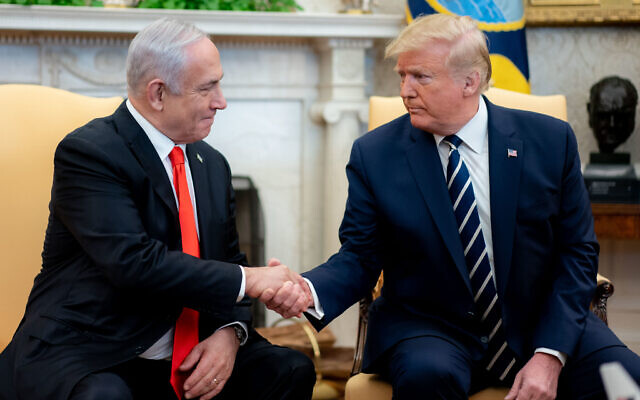
Jordan’s Washington envoy warns that Hashemite Kingdom would rethink peace treaty; meanwhile, former MKs urge members of Congress to speak out against PM’s plan.
WASHINGTON — Policy makers and diplomats in Washington are increasingly warning that the Israeli government’s plans to annex parts of the West Bank, backed by the US, would spark a crisis and damage the possibility of a two-state solution.
With Prime Minister’s Benjamin Netanyahu’s July 1 start date fast approaching, multiple stakeholders in the conflict have pleaded with the Trump administration and members of Congress this week to oppose Netanyahu’s vow to unilaterally extend Israeli sovereignty to the settlements and the Jordan Valley — the 30% of the West Bank allocated to Israel under the Trump peace plan.
On Monday, Jordan’s Ambassador to the United States Dina Kawar joined other officials from Amman in warning that the Hashemite Kingdom would re-evaluate its peace agreement if Israel if were to go through with annexation.
“When we signed the treaty in 1994, the euphoria of peace, the trust that was existing then — the idea of this cooperation, between the Jordanians, the Palestinians, and Israel — it was some beautiful dream that we had then,” Kawar told the American Jewish Committee during a Zoom teleconference.
“And now, when you look [at] where we’re going, I ask myself, What for? Is it something that the Israelis want going toward this eventual situation? Is it something that we can impose on the Palestinians? And is it something that’s safe for us as Jordanians?”
The American Israel Public Affairs Committee (AIPAC) has told members of Congress that it has no objection to them criticizing Netanyahu’s annexation plans.
The powerful pro-Israel lobby usually works assiduously to discourage any criticism of Israel, making the new stance all the more noteworthy.
Under a coalition deal between Netanyahu and Defense Minister Benny Gantz, Israel’s government can pursue annexation backed by the US starting July 1. The Trump administration has indicated it will not oppose Israeli moves to annex lands that would become part of the country under its peace plan, which conditionally envisions a Palestinian state on the remaining some 70 percent of the West Bank, pockmarked with Israeli settlement panhandles and enclaves.
The plan has been met with vociferous opposition in Europe, some of the Arab world and domestically, with warnings that it could add instability in the region, lead to further international isolation of Israel and damage Israel’s democratic character.
Netanyahu and many on the Israeli right have defended the annexation moves as long-sought recognition of a reality on the ground after decades of settlement building and military occupation of the West Bank, with peace efforts long moribund due to Palestinian intransigence.
On Tuesday, a group of 25 former Knesset members sent a letter to members of Congress strongly urging them to speak out against Israel unilaterally annexing any part of the West Bank, warning that it would destroy the Zionist ideal of a Jewish democracy.
“To safeguard Israel’s future as a democratic homeland for the Jewish people and to preserve hope for a negotiated resolution to the Israeli-Palestinian conflict, it is imperative that we speak out against unilateral annexation,” the letter says. “Whether this move will take form in a government decision or through legislation in the Knesset, it will inevitably create an unfathomable reality of apartheid in Israel.”
Among the signatories was former director of the Mossad Danny Yatom, former Knesset speaker Avrum Burg and former minister Ephraim Sneh.
On Capitol Hill, Democrats have been imploring Netanyahu not to take annexation forward for months. In December, the Democrat-controlled House of Representatives passed a resolution mostly along partisan lines opposing annexation and supporting a two-state solution.
Over the last several weeks, more Democratic leaders have spoken out against the prospects of Israel extending sovereignty to the West Bank settlements, but have not articulated what the US policy reaction should be if Netanyahu plows ahead anyway.
Colorado Senator Michael Bennet sent a letter to US Secretary of State Mike Pompeo Wednesday, urging him to block annexation, saying the move would “diminish future prospects for [peace] talks and could potentially destabilize the region further, undermining US and Israeli security interests,” according to Jewish Insider.
That missive came after 18 Democratic senators wrote to Netanyahu and new Alternate PM Gantz last month saying annexation “would have a clear impact on both Israel’s future and our vital bilateral and bipartisan relationship.”
Other leading Democrats have voiced concerns, as well, including House Speaker Nancy Pelosi and Democratic presidential nominee Joe Biden.
Pelosi said last week that annexation would hurt US interests while Biden has stated on multiple occasions that it would “choke off any hope for peace.”
The former vice president’s declarations have not satisfied the Palestinians, however. In May, the PA’s envoy to the United Kingdom Husam Zomlot decried Biden’s position as not strong enough, arguing that his refusal to call for reducing aid to Israel sent the prime minister a message that he could carry out his plan without fearing harsh repercussions.
“It’s nothing that would actually dissuade Netanyahu from going ahead with annexation,” Zomlot said.
Still, Israel’s Washington envoy Ron Dermer has been pushing the Trump administration to give Israel the green light to carry out its plan, fearing that Biden might block it if he’s elected, according to a Channel 13 report in May.
While the State Department has said it is ready to recognize Israel’s annexation of parts of the West Bank, an official told The Times of Israel in April that the step should be “in the context of the Government of Israel agreeing to negotiate with the Palestinians along the lines set forth in President Trump’s Vision.”
The move, if enacted, would be a major turning point in the Israeli-Palestinian conflict, with Palestinians, foreign leaders, US lawmakers and veteran peace negotiators saying it would severely weaken the prospects of the internationally long-endorsed two-state solution.
(Times of Israel).
